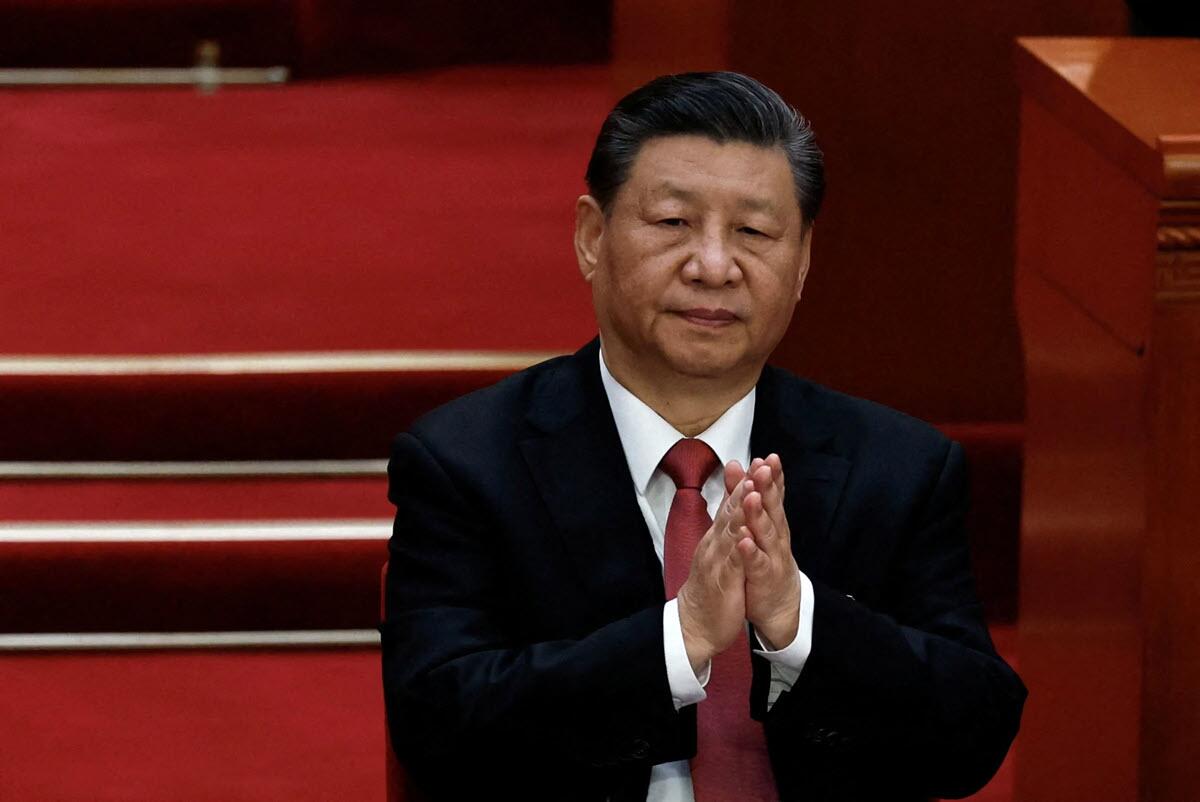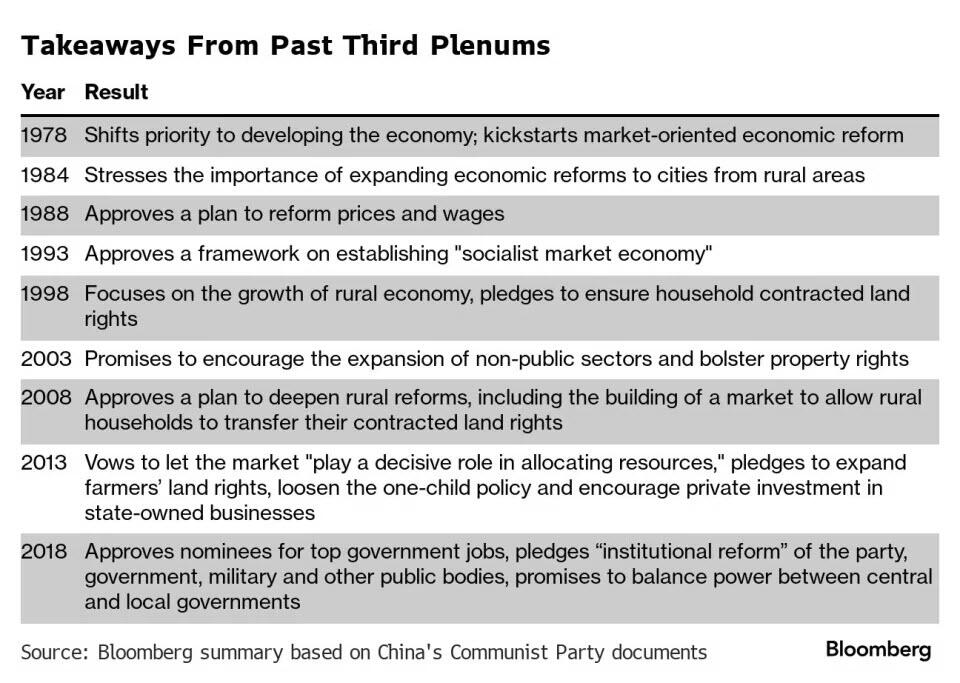China's Third Plenum Concludes: Here Are The Main Takeaways As China Slides Into "History's Garbage Time"
While a far cry from the market-moving event it used to be just a few years ago (when it promised to unleash a firehose of inflationary, stimulative liquidity) the third Chinese plenum - which sets out the country’s economic priorities for the next five years - concluded on Thursday and delivered some newsworthy developments, most notably that President Xi Jinping vowed to “deepen reform” and “resolve” the risks of mounting real estate and local government debt as well as make “high-quality development” the guiding force of the world’s No. 2 economy, showing few initial signs that the top leadership is preparing to unleash major steps to boost demand or arrest the property slump... which is precisely why the market - long ago addicted to China's fiscal firehose - completely ignored it.
As Bloomberg reports, the ruling Communist Party signaled China will stay on course with Xi’s plan to use advanced manufacturing to generate growth, in a vaguely worded statement Thursday marking the close of a twice-decade conclave that’s often heralded major policy shifts but not this time. And as Bloomberg notes, the focus on the factory engine could increase trade tensions, with a surge in Chinese exports already prompting fresh tariffs from the US and the European Union.
The recommendations set in motion Xi’s ambitions of a technologically sovereign country with a strong socialist market economy, though it did little to address the low consumer spending that economists hoped could boost China’s slowing economy.
“High-quality development is the top mission of building a modern socialist country,” the official Xinhua News Agency said after the four-day meeting in Beijing. That opaque and vague slogan is interpreted to emphasize the quality of economic growth over its absolute pace and to warn that a flood of stimulus is not coming. It centers on Xi’s ambitions to move up the value chain through tech innovation and become more resilient against US trade curbs.
While there were no major surprises, here are the key takeaways:
As per Xinhua the Third Plenum Communique adopted resolution on further deepening reform
comprehensively along the following lines
Economic Stimulus:
- "It is necessary to guide reform with the new development concept, based on the new development stage, deepen supply-side structural reform, improve the incentive and constraint mechanism to promote high-quality development, and create new momentum and new advantages for development."
- "We must implement macroeconomic policies in accordance with the decisions and arrangements of the Party Central Committee on economic work, actively expand domestic demand, develop new quality productivity in accordance with local conditions, accelerate the cultivation of new foreign trade momentum, solidly promote green and low-carbon development, effectively protect and improve people's livelihood, and consolidate and expand the results of poverty alleviation."
- "We must persist in doing our best and acting within our means, improve the basic public service system, strengthen the construction of inclusive, basic and basic livelihood, solve the most direct and practical interests that the people are most concerned about, and continuously meet the people's yearning for a better life."
- "It is necessary to improve the macroeconomic regulation system, coordinate and promote reforms in key areas such as finance and taxation, and enhance the consistency of macroeconomic policy orientation."
National Security:
- "The plenary session pointed out that national security is an important foundation for the steady and long-term development of China's modernization. It is necessary to fully implement the overall national security concept, improve the system and mechanism for maintaining national security, achieve a benign interaction between high- quality development and high-level security, and effectively ensure the long-term stability of the country."
- "It is necessary to improve the national security system, improve the public security governance mechanism, improve the social governance system, and improve the foreign-related national security mechanism."
- "The plenary session pointed out that the modernization of national defense and the army is an important part of China's modernization. We must uphold the absolute leadership of the Party over the people's army, implement the strategy of reform and strengthening the army in depth, and provide a strong guarantee for achieving the goal of the centenary of the founding of the army as scheduled and basically realizing the modernization of national defense and the army."
Indirect Impact on Housing Market:
- "The plenary session proposed that the integrated development of urban and rural areas is an inevitable requirement for China's modernization. It is necessary to coordinate new industrialization, new urbanization and comprehensive rural revitalization, comprehensively improve the integration level of urban and rural planning, construction and governance, promote equal exchange and two-way flow of urban and rural factors, narrow the gap between urban and rural areas, and promote the common prosperity and development of urban and rural areas."
- "It is necessary to improve the system and mechanism for promoting new urbanization, consolidate and improve the basic rural management system, improve the support system for strengthening, benefiting and enriching farmers, and deepen land system reform."
Long-Term Goals and Reforms:
- "By 2035, a high-level socialist market economic system will be fully established."
- "By 2029, the 80th anniversary of the founding of the People's Republic of China, the reform tasks proposed in this decision will be completed."
- "We must consciously put reform in a more prominent position and further comprehensively deepen reform around promoting Chinese-style modernization."
“There remains a strong emphasis on high-quality growth. This means the tolerance for a period of modestly slower growth remains in place,” said Becky Liu, head of China macro strategy at Standard Chartered. “And the bar for strong short-term economic stimulus remains very high.”
The lack of any tantible results may eventually fade away because the ruling party - technically the only party - normally issues a more detailed report several days after concluding the Third Plenum. Specific policies taking cues from the confab are more likely to come from a sit-down of China’s 24-man Politburo later this month, which typically focuses on economic issues for the year.
Chinese officials are facing calls to rebalance their economy, as consumer spending slows while exports surge and policy focuses on new green sectors such as electric cars and solar panels. Second-quarter data undershot expectations this week, after retail sales in June rose at the slowest pace since 2022 piling pressure on Beijing to do more to stimulate the consumer.
Officials put “actively expanding domestic demand” on their to-do list but only as a short-term task in the communique. Despite that, authorities reaffirmed their determination to hitting this year’s social and economic goals, which include an annual growth target of about 5%.
Good luck achieving that without injecting several trillion first... and once Beijing admits there is no way around this simple math, watch as everything that is not nailed down explode higher in price and wrecks the upcoming Fed rate-cutting cycle, even though Xi has said GDP should no longer be “the sole yardstick of success for development” for obvious reasons: it now take far more than 1 yuan in new debt to grow GDP by 1 yuan.
Other priorities include creating an improved system for setting macroeconomic policies — potentially a reference to avoiding abrupt crackdowns such as those that rocked the education and tech sectors years ago and dented investor confidence.
This meeting, which was delayed from last year, comes as Chinese policymakers struggle to arrest a crisis in the property market, where the citizens store much of their wealth. Falling house prices and a weak job market have sent China into its longest deflationary streak since 1999.
That’s causing a growing sense of malaise, with some citizens branding the post-pandemic era “history’s garbage time” — a phrase referring to final moments of a sports game when a losing team has no chance of making a comeback.
Officials vowed to strengthen the guidance of public opinion and “effectively maintain social stability,” without elaborating. “We must enhance cultural confidence, develop advanced socialist culture,” the party pledged, “and build a more effective international communication system.”
The real estate sector, which at one point accounted for a quarter of China’s gross domestic product, was mentioned just once in the nearly 4,000-word announcement. It was stated only in the context of managing risk, a potential signal no dramatic stimulus measures are forthcoming.
Beijing introduced a broad real estate policy package in May, which centered on relaxing mortgage rules and encouraging local governments to buy unsold homes. It has, so far, had a modest impact.
The government appeared to skip a once-popular phrase that the market should play a “decisive role,” which was used as recently as the last leadership reshuffle in 2022. The ruling party instead said officials should be able to both “let it go” and “control it.” Authorities have signaled a new willingness to control markets in recent months, with the central bank readying a multi-billion yuan pool of bonds to cool a record-breaking rally.
“Measures look to be more focused on the supply side rather than the demand side,” said Bruce Pang, chief economist for Greater China at Jones Lang LaSalle Inc. “That said, the mentioning of urban-rural integration, people’s well-being and fiscal and taxation reform should help improving domestic demand.”
The scope of the communique — spanning everything from economic to political and social issues — reflected the complex challenges facing China, said Alfredo Montufar-Helu, head of the China Center at The Conference Board.
“But in trying to tackle each and every one of these challenges, it unfortunately reads as lacking the focus the market expected,” he added, citing “structural issues that are dragging down consumer confidence and impeding China’s transition to a more sustainable development model.”
Military modernization was named a key priority in the document, as the party vowed to improve its social governance operations, as well as national and foreign-related security mechanisms.
NEVER MISS THE NEWS THAT MATTERS MOST
ZEROHEDGE DIRECTLY TO YOUR INBOX
Receive a daily recap featuring a curated list of must-read stories.




